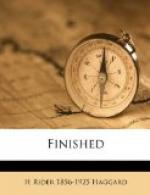On the following day we reached the hot, low-lying veld which the herd of buffalo was said to inhabit. Next morning, however, when we were making ready to begin hunting, a Basuto Kaffir appeared who, on being questioned, said that he was one of Sekukuni’s people sent to this district to look for two lost oxen. I did not believe this story, thinking it more probable that he was a spy, but asked him whether in his hunt for oxen he had come across buffalo.
He replied that he had, a herd of thirty-two of them, counting the calves, but that they were over the Oliphant’s River about five-and-twenty miles away, in a valley between some outlying hills and the rugged range of mountains, beyond which was situated Sekukuni’s town. Moreover, in proof of his story he showed me spoor of the beasts heading in that direction which was quite a week old.
Now for my part, as I did not think it wise to get too near to Sekukuni, I should have given them up and gone to hunt something else. Anscombe, however, was of a different opinion and pleaded hard that we should follow them. They were the only herd within a hundred miles, he said, if indeed there were any others this side of the Lebombo Mountains. As I still demurred, he suggested, in the nicest possible manner, that if I thought the business risky, I should camp somewhere with the wagon, while he went on with Footsack to look for the buffalo. I answered that I was well used to risks, which in a sense were my trade, and that as he was more or less in my charge I was thinking of him, not of myself, who was quite prepared to follow the buffalo, not only to Sekukuni’s Mountains but over them. Then fearing that he had hurt my feelings, he apologized, and offered to go elsewhere if I liked. The upshot was that we decided to trek to the Oliphant’s River, camp there and explore the bush on the other side on horseback, never going so far from the wagon that we could not reach it again before nightfall.
This, then, we did, outspanning that evening by the hot but beautiful river which was still haunted by a few hippopotamus and many crocodiles, one of which we shot before turning in. Next morning, having breakfasted off cold guineafowl, we mounted, crossed the river by a ford that was quite as deep as I liked, to which the Kaffir path led us, and, leaving Footsack with the two other boys in charge of the wagon, began to hunt for the buffalo in the rather swampy bush that stretched from the further bank to the slope of the first hills, eight or ten miles away. I did not much expect to find them, as the Basuto had said that they had gone over these hills, but either he lied or they had moved back again.
Not half a mile from the river bank, just as I was about to dismount to stalk a fine waterbuck of which I caught sight standing among some coarse grass and bushes, my eye fell upon buffalo spoor that from its appearance I knew could not be more than a few hours old. Evidently the beasts had been feeding here during the night and at dawn had moved away to sleep in the dry bush nearer the hills. Beckoning to Anscombe, who fortunately had not seen the waterbuck, at which he would certainly have fired, thereby perhaps frightening the buffalo, I showed him the spoor that we at once started to follow.




